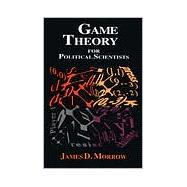
Note: Supplemental materials are not guaranteed with Rental or Used book purchases.
Purchase Benefits
What is included with this book?
| List of Figures and Tables | |
| Preface and Acknowledgments | |
| Overview | p. 1 |
| What Is Game Theory? | p. 1 |
| What Can You Do with Game Theory? | p. 2 |
| Four Problems in Political Science | p. 3 |
| Why Model? | p. 6 |
| The Rational Choice Approach to Social Modeling | p. 7 |
| Utility Theory | p. 16 |
| The Concept of Rationality | p. 17 |
| How Do Utility Functions Predict Actions? | p. 22 |
| An Example: Nixon's Christmas Bombing | p. 25 |
| Certainty, Risk, and Uncertainty | p. 28 |
| Utility Theory under the Condition of Risk | p. 29 |
| Some Common Misconceptions about Utility Theory | p. 33 |
| Utility Functions and Types of Preferences | p. 34 |
| A Simple Example: The Calculus of Deterrence | p. 38 |
| Another Simple Example: The Decision to Vote | p. 43 |
| Why Might Utility Theory Not Work? | p. 44 |
| Specifying a Game | p. 51 |
| Formalizing a Situation: Deterrence in the Cuban Missile Crisis | p. 51 |
| Games in Extensive Form | p. 58 |
| Games in Strategic Form | p. 65 |
| Classical Game Theory | p. 73 |
| Defining the Terms of Classical Game Theory | p. 74 |
| Domination, Best Replies, and Equilibrium | p. 77 |
| Mixed Strategies | p. 81 |
| The Minmax Theorem and Equilibria of Two-Person, Zero-Sum Games | p. 89 |
| Characteristics of Nash Equilibria | p. 91 |
| Nash Equilibria and Common Conjectures | p. 94 |
| Rationalizability | p. 98 |
| Political Reform in Democracies | p. 101 |
| Candidate Competition in the Spatial Model of Elections | p. 104 |
| A Very Brief Introduction to Cooperative Game Theory | p. 111 |
| Solving Extensive-Form Games: Backwards Induction and Subgame Perfection | p. 121 |
| Backwards Induction | p. 124 |
| Subgame Perfection | p. 128 |
| Sophisticated Voting | p. 133 |
| Agenda Control | p. 135 |
| Legislative Rules and Structure-Induced Equilibria | p. 138 |
| The Rubinstein Bargaining Model | p. 145 |
| Bargaining in Legislatures | p. 149 |
| Why Might Backwards Induction Yield Counterintuitive Results? | p. 156 |
| Beliefs and Perfect Bayesian Equilibria | p. 161 |
| Bayes's Theorem | p. 163 |
| The Preference for Biased Information | p. 166 |
| Perfect Bayesian Equilibria | p. 170 |
| Nuclear Deterrence | p. 180 |
| More on Noncooperative Equilibrium: Perfect and Sequential Equilibria | p. 188 |
| Elimination of Weakly Dominated Strategies | p. 189 |
| Perfect Equilibrium | p. 192 |
| Sequential Equilibrium | p. 196 |
| Deterrence and the Signaling of Resolve | p. 199 |
| "Why Vote?" Redux | p. 212 |
| Games of Limited Information and Restrictions on Beliefs | p. 219 |
| Signaling Games | p. 222 |
| The Informational Role of Congressional Committees | p. 227 |
| Bargaining under Incomplete Information | p. 237 |
| Deterrence and Out-of-Equilibrium Beliefs | p. 241 |
| An Introduction to Restrictions on Beliefs | p. 244 |
| "Cheap Talk" and Coordination | p. 250 |
| Repeated Games | p. 260 |
| Thinking about Repetition: Iterated Prisoner's Dilemma | p. 262 |
| Folk Theorems | p. 268 |
| Finite Repeated Games: The Chain Store Paradox | p. 279 |
| Stationarity | p. 291 |
| Retrospective Voting and Electoral Control | p. 293 |
| Conclusion: Where Do We Go from Here? | p. 302 |
| How Do Formal Models Increase Our Knowledge? | p. 302 |
| The Weaknesses of Game Theory | p. 305 |
| How Does One Build a Model? | p. 311 |
| Appendix 1: Basic Mathematical Knowledge | p. 315 |
| Algebra | p. 315 |
| Set Theory | p. 318 |
| Relations and Functions | p. 320 |
| Probability Theory | p. 320 |
| Limits | p. 322 |
| Differential Calculus | p. 323 |
| Partial Derivatives and Lagrange Multipliers | p. 327 |
| Integral Calculus | p. 329 |
| The Idea of a Mathematical Proof | p. 331 |
| Answers to Selected Problems | p. 333 |
| Notes | p. 345 |
| Glossary of Terms in Game Theory | p. 349 |
| Bibliography | p. 355 |
| Index | p. 365 |
| Table of Contents provided by Publisher. All Rights Reserved. |
The New copy of this book will include any supplemental materials advertised. Please check the title of the book to determine if it should include any access cards, study guides, lab manuals, CDs, etc.
The Used, Rental and eBook copies of this book are not guaranteed to include any supplemental materials. Typically, only the book itself is included. This is true even if the title states it includes any access cards, study guides, lab manuals, CDs, etc.